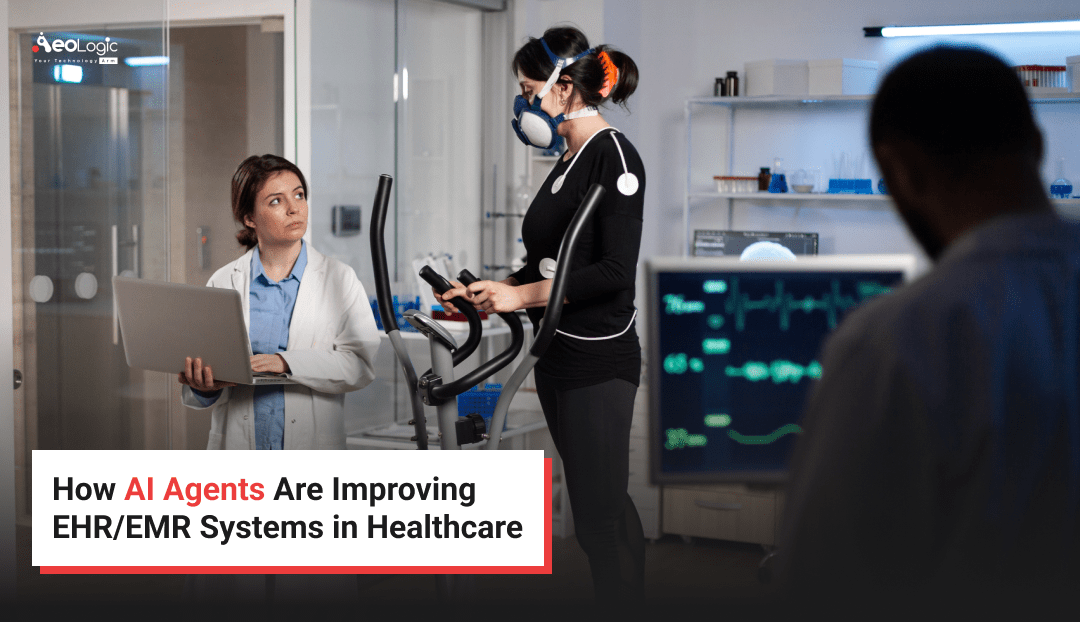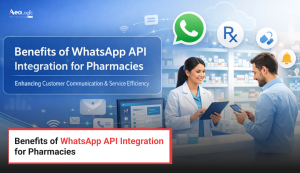Electronic health records and electronic medical records are two distinct aspects of the healthcare industry that are helping it grow digitally. However, traditional methods involved in the development of EHR and EMR cannot help much in this advanced era, as healthcare experts are moving towards more advanced solutions.
AI agents have made an entry into the healthcare industry and are being adopted by healthcare organizations at a rapid pace. But why does it require AI agents? The traditional EHR and EMR systems have faced various problems, including being cumbersome and unintuitive for users, time-consuming due to manual data entry, fragmented, lacking interoperability, and reactive, not proactive in clinical decision-making. So to solve these problems, the adoption of AI agents is very crucial.
AI agents greatly enhance EHR/EMR systems by automating processes, improving data management, and offering clinical decision assistance. They increase patient outcomes and operational efficiency by streamlining processes, customizing patient care, and facilitating better resource allocation.
Healthcare companies can use AI agents to build a more effective, patient-centered, and responsive healthcare system by adopting these developments. By integrating agentic AI as a part of EHR software development services or after. They help by auto-filling patient forms, pulling up historical data, and tracking treatment progress. This way, healthcare teams can move faster with fewer mistakes.
Why Agentic AI is the Future of Healthcare: Market Insights
The global AI agents market size is calculated at USD 7.92 billion in 2025 and is forecasted to reach around USD 236.03 billion by 2034, accelerating at a CAGR of 45.82% from 2025 to 2034.
The global agentic AI in healthcare market size was estimated at USD 538.51 million in 2024 and is projected to reach USD 4.96 billion by 2030, growing at a CAGR of 45.56% from 2025 to 2030.
A significant 94% of healthcare organizations view AI as core to their operations, and 86% are already extensively using it. AI agents are particularly effective in automating administrative tasks, improving diagnostic accuracy, and personalizing treatment plans. 94% of healthcare organizations view AI as core to their operations , and 86% of healthcare organizations are using AI extensively right now.
The adoption rate is expected to rise even further as more healthcare providers recognize AI agents’ potential to automate administrative tasks, improve diagnostic accuracy, and personalize treatment plans. With continuous innovation and expanding use cases, AI agents are transforming healthcare delivery at an unprecedented pace, making their integration indispensable for modern healthcare systems.
Explore more: The Future of Agentic Process Automation
What are AI Agents in EHR/EME Systems in Healthcare?
Let’s first understand what the EHR and EME system means. The EHR or electronic health records, generally refers to the system that stores the past historical data of a patient of various healthcare organizations. The EMR or electronic medical record, refers to the system that stores the specific healthcare information about the patients of a specific healthcare organization.
Now, let’s understand what AI agents are. Artificial intelligence (AI) agents are semi-autonomous or autonomous programs that communicate intelligently with humans and data systems using machine learning, natural language processing (NLP), and predictive analytics. The AI agents offer various good things for healthcare, such as automated documentation. Predict outcomes, suggest clinical decisions, flag potential issues in real-time.
Also Read: The Benefits of Partnering with An AI Automation Agency
Types of Medical Institutions that Need AI-Powered Agents
While the needs of medical institutions differ, several types of healthcare facilities derive substantial benefits from adopting AI-powered agents to improve efficiency, accuracy, and patient care.
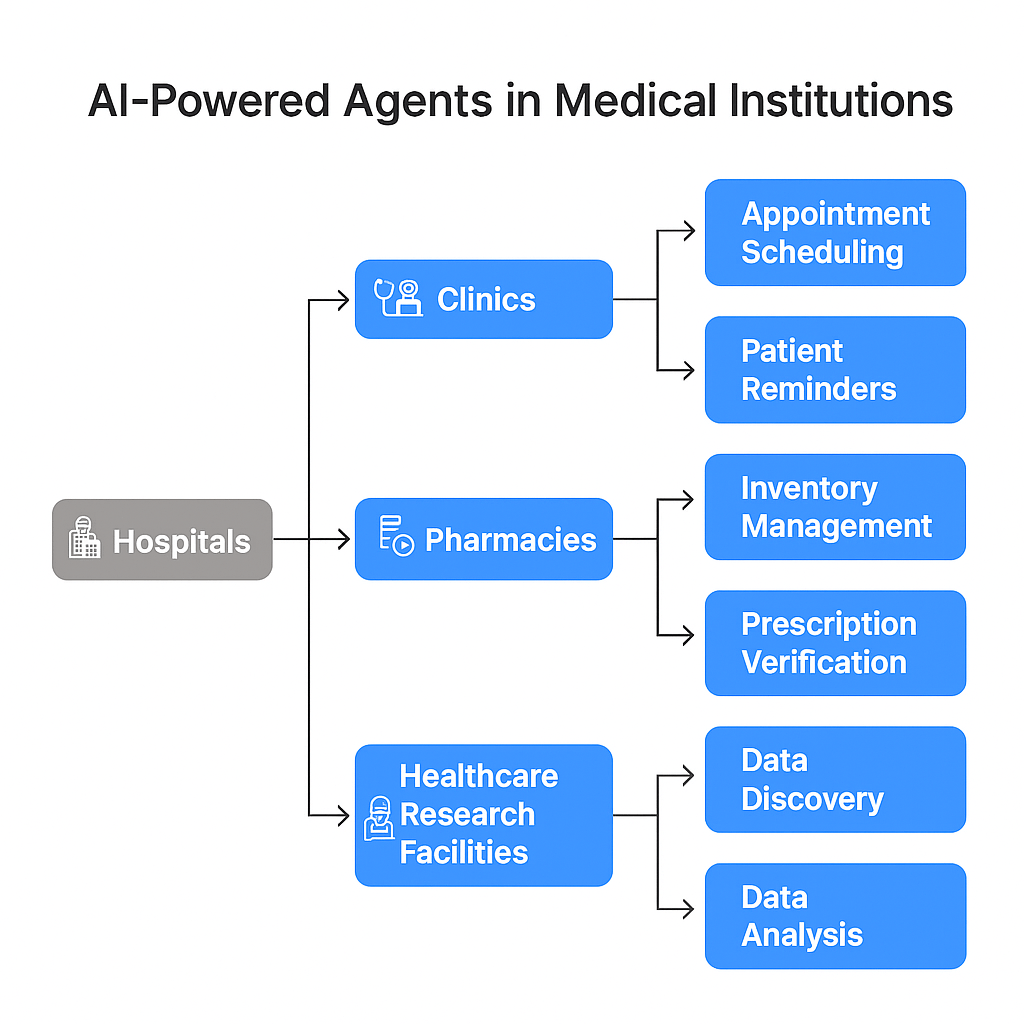
Hospitals
Hospitals deal with immense amounts of patient information, complicated care protocols, and complex multidisciplinary teams in time-sensitive and highly charged environments. AI agents are offering many new workflow efficiencies with respect to time-consuming administrative functions – from patient registration to billing and claims processing. AI also assists in the organization of, and updates to, Electronic Health Records (EHR), which helps ensure that the data is accurate and available in real time.
Moreover, AI-assisted imaging diagnostic tools are generating accuracy in clinical assessments of images in addition to analyzing all data available to the referring physician for better information for early detection and personalized treatment plan creation. This benefit of AI automation aids in human error reduction with clinical time used for patient centric care and critical decision making.
Clinics
Many clinics (especially smaller and/or specialty clinics) operate with limited staff and tight budgets. AI agents act as virtual assistants, dealing with the scheduling of appointments, patient reminder calls, and electronic check-ins, reducing no-shows and improving workflow in practice.
AI’s ability to send follow-up scheduling notifications and incidental communications with the patient universe frees healthcare providers to focus on providing effective care. AI can also assist with symptom assessment with preliminary triaging of the patient.
The net result is increased patient satisfaction, increased use of resources, and improved productivity overall for the clinics.
Pharmacies
Within a pharmacy, managing simultaneously an enormous number of medication types, trying to accomplish accurate dispensing, and responding to patient questions is extremely complex with extreme time limitations. AI agents would assist pharmacies with inventory management by monitoring prescription patterns and anticipating medication needs proactively, and they would create refill orders autonomously. Automating, predicting, and proactively placing orders improves inventory management and could lead to fewer stockouts or overstocking and, therefore, waste.
Also, by automating prescription management, AI agents could assist in verifying drug interactions and insurance claims accuracy, aiding in rooting out human errors that could cost a pharmacy and/or cause harm to a patient.
When using chatbots solution for customers, AI could help patients with common medication questions and proactively continue to serve them with refill reminders, messaging, and information. All of these efficiencies would improve pharmacy service, cost, and, most importantly, patient safety.
Healthcare Research Facilities
Research institutes and laboratories create and process large amounts of data in clinical trials, drug discovery, and epidemiological studies.
AI agents can really push research by automating the discovery of data from multiple sources, cleaning the datasets, and doing complicated analysis with a greater degree of accuracy.
AI agents can track progress throughout experiments, collect compliance documentation, and provide added insight into generated datasets when humans review them. This enhances the speed and reliability of the research outcomes, allows for actionable and reliable insights to be generated quickly, and innovations to be rapidly pursued.
AI enables researchers to channel their efforts into moments of ingenuity that lead to possibilities to radically transform healthcare by generally reducing errors and heightening levels of productivity.
Looking for? Top AI Development Companies That Help Businesses Scale
Key Use Cases of AI Agents in EHR/EMR Systems in Healthcare
There are various key use cases of AI agents in EHR/EMR systems in healthcare. Here are a few key use cases mentioned below.
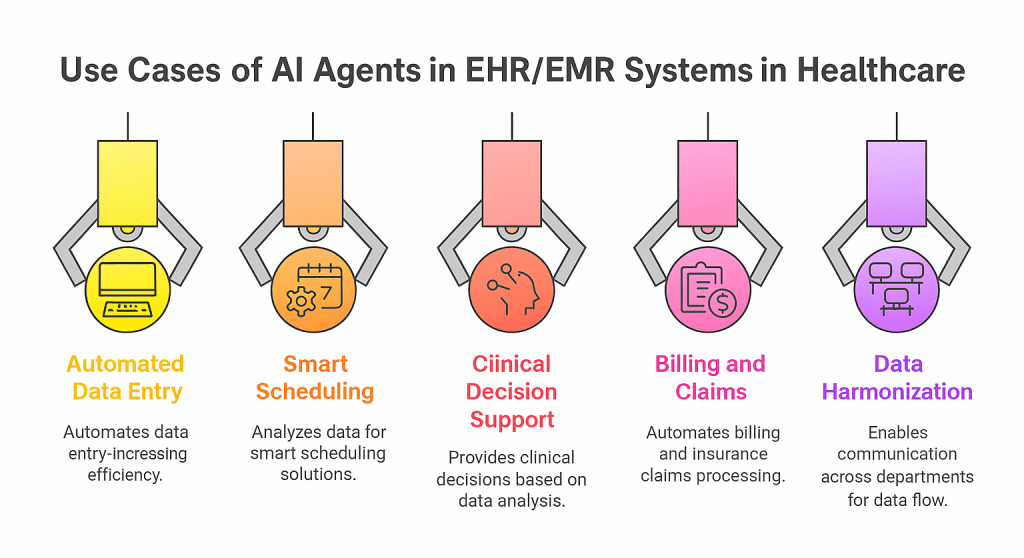
Automated Data Entry and Documentation
Data entry and documentation could be hectic work for the healthcare administration. The manual uploading of data into the EHR/EMR could be time-consuming and frustrating. The AI agents in healthcare can easily integrate with the EHR/EMR system and enable automated data entry and documentation. This offers accuracy, increases work efficiency, and reduces the manual for the healthcare providers. Overall, it’s a great use case for AI agents.
Smart Scheduling and Resource Allocation
Scheduling creates a hectic time for the healthcare organizations and also for the patients, which overall impacts the EHR/EMR. Also, improper resource allocation could result in inefficiencies in healthcare.
The AI agents-powered system can analyze past appointment data, staff numbers, and workflow-related data from the EHR/EMR that can be used to provide smart scheduling. The resource allocation can be enhanced by analyzing the identifying the right amount of resources needed for the right place.
Clinical Decision Support
The conventional EHR/EMR system cannot properly optimize to provide proper diagnosis solutions for healthcare as the traditional system cannot analyze the data properly and immediately.
The AI agents in healthcare can easily integrate with the EHR/EMR and analyze the data like lab results, patient history, medical images, etc, that provide clinical decisions for every condition. This could be a great use case in the situation of emergencies.
Billing and Claims Automation
Manual transactions, billing, and claims in healthcare could be very hectic, as there is a lot of data in the EHR/EMR system that cannot be used to make searches. Sometimes, consumers make claims, but manual identification of claims could take many days.
The AI agents can integrate with the EHR/EMR to review codes, flag inconsistencies and generate insurance claims to get the job done within the least time. Billing automation also enables more accuracy in the financial department and stores records safely and in a structured way.
Data Harmonization and Interoperability
The EHR/EMR works better if all departments can communicate smoothly, and it’s not possible with the conventional system. The AI agents can enable the integration and communication channel across the various departments and clinics, which enables a smooth flow of information and data. This establishes better collaboration and understanding among the healthcare organization and enhances efficiency. 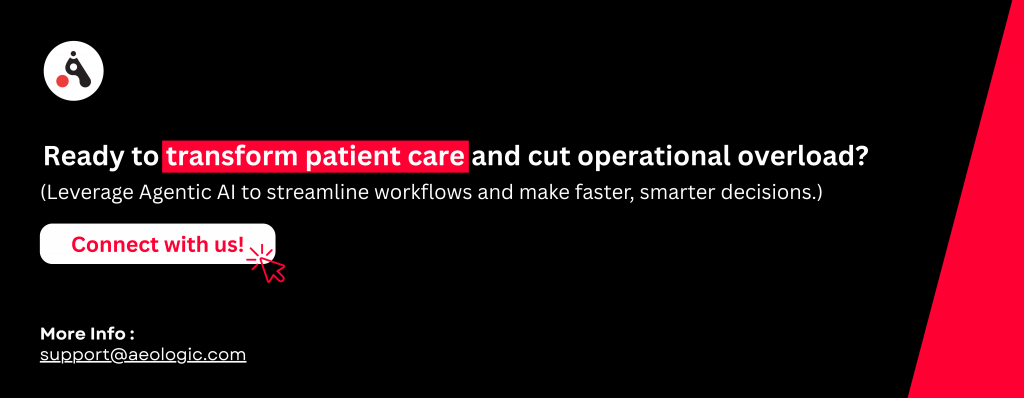
Top Benefits of AI Agents for EHR/EMR Systems in Healthcare
There are a lot of benefits of AI agents for EHR/EMR systems in healthcare. Here are a few key benefits:
Personalization for Patients
The integration of AI agents in the EHR/EMR can help healthcare organizations provide immediate information about the patient’s conditions. The provided data can be analyzed with the AI algorithm that enables personalization for the patients. Patients can get personalized scheduling, medicines, environment, etc that enable better patient care.
Boosted Staff Productivity
Better productivity matters too much to enhance the whole organization. The conventional system cannot offer various advanced features to boost productivity. Where the AI agents with the integration with EHR/EMR enable automation of various tasks enable staff members to work on more complex tasks that overall boost productivity. It would not be possible without the data from EHR/EMR, so the AI agents and existing systems both have importance.
Also Read: How GenAI Is Revolutionizing The Pharmaceutical Industry?
Remote Health Monitoring
Remote health monitoring is a trending topic in healthcare organizations. The conventional medical system cannot extract the information about the patient from EHR/EMR properly to make the most of it. Where the AI agents can integrate with IoT solutions to collect data and share information with the existing record system to provide remote monitoring for the patient.
Cost Reduction and Operational Efficiency
Data entry, documentation, and other administrative expenses can be greatly decreased with AI agent-powered automation. AI agent’s integration with EHR/EMR collects and analyzes data that can improve inventory control, workforce levels, and other procedures related to resource allocation. Through data analysis and the identification of possible medication candidates, AI can speed up the drug development process. These all overall enable cost reduction and enhance operational efficiency.
We Provide “Generative AI Solutions“
How Much Does It Cost to Implement AI Agents in Healthcare in 2025?
There are different estimated costs of AI agents that are also influenced by different factors. Here are the ones mentioned below.
- Basic Agent (e.g., FAQ Bot): $5,000 – $15,000 as it is ideal for small businesses needing simple query handling with minimal AI complexity.
- Intermediate Agent (e.g., Contextual Assistant): $15,000 – $50,000, suit enterprises requiring conversational AI with contextual understanding and integrations.
- Advanced Agent (e.g., LLM + Multimodal): $50,000 – $200,000+, Encompasses cutting-edge AI, including multimodal inputs, autonomous decision-making, and deep system integrations for large enterprises.
- Agents here must comply with healthcare regulations (e.g., HIPAA), increasing AI agent implementation costs. Appointment schedulers, symptom checkers, and virtual nurses may cost upwards of $150,000.
- Hiring a small in-house team could set you back $600,000–$1,000,000 a year.
- The cost to integrate your AI agents system with your existing CRM, ERP, EHR/EMR, or other legacy systems can range from $25,000 to $200,000, depending on the complexity of your infrastructure.
Also Read: Generative AI in Healthcare: Use Cases, Benefits, and Challenges
How Aeologic Can Help You Implement AI Agents in Healthcare?
Aeologic Technologies is a prime provider of AI healthcare technology solutions. We offer in-depth experience in AI agent development and can easily embed intelligent systems into your healthcare organization to automate tasks, enhance patient data management, and aid clinicians in their decision making.
Aeologic offers end-to-end support for AI development—servicing your organization from the initial consultation to implementation and beyond, building customized AI agents that plug into your existing EHR/EMR systems.
Our services add value in all aspects of the healthcare value stream from diagnostics, operational efficiency, and patient-specific care through machine learning and natural language processing.
Choose to collaborate with Aeologic and access the latest in AI solutions and technologies while ensuring compliance, security, and scalability. We can help healthcare organizations automate defensible, accountable, and value-based models that reduce burdensome administrative costs while providing more efficient ways to achieve the best outcome for patients.
Also Read: The Benefits of AI Solutions in Business Growth
Final Take
AI agents are transforming electronic medical record (EMR) and electronic health record (EHR) systems in the healthcare industry, resulting in better patient care, more data-driven decision-making, better personalization, better workflow efficiency, better use of data by integration with the EHR/EMR systems and more efficient operations.
AI is going to be more advanced in the future with some incredible trends and technology as healthcare organizations can develop a more efficient, patient-centered, and ultimately more effective healthcare system by adopting these technologies.
FAQs
How Are AI Agents Enhancing EHR and EMR Systems in Healthcare?
AI agents enhance the functionality of EHR and EMR systems by assisting with data entry, extracting knowledge, and automating workflows. AI tools quickly interpret patient data in real time, assisting providers in making faster, better decisions. By providing AI tools with context, AI tools can analyze and identify patterns and predict patient risk, in addition, to automating personalized treatment, as well as improving documentation.
Also, the integration of data from multiple systems creates better interoperability, provides fewer opportunities for human error, and improves documentation. Ultimately, AI agents can make EHR and EMR systems smarter, more efficient, and better able to respond to the needs of changing healthcare providers and their patients.
How does AI Integration Improve Accuracy and Efficiency in EHR/EMR Systems?
The integration of AI improves accuracy by automating data validation and reducing human error that can occur with record entries. It can quickly sift through the data to find inconsistencies or missing elements in large datasets. Efficiency improves as AI agents automate mundane tasks, such as scheduling, coding, or billing, which allows clinicians to spend more time with patients.
Also, with Natural Language Processing, the system can extract meaning quickly from unstructured notes within the records. This reduces the time spent on documentation, helps speed up workflows, and improves consistency of data quality, ultimately leading to improved patient outcomes and streamlined operations within the healthcare organization.
What are the Key Features of AI-Powered EHR/EMR Solutions?
AI-enabled EHRs/EMRs offer cooler tools, including automated data entry and predictive analytics, and real-time decision support. The Natural Language Processing capabilities mean it can understand and sort unstructured clinical notes within the EHR. More advanced systems have intelligent coding capabilities to assist with billing and compliance. AI can detect anomalies, which can indicate problems within the data or in cases of fraud.
Also, these solutions have patient risk stratification, as well as personalized recommendations for treatments. They include some level of integration that allows interoperability and easy data-sharing effectively across multiple source platforms. Overall, not only can we guarantee improved surface data accuracy, but it also improves performance, reduces routine administrative burdens, but also gives actionable intelligence to the clinicians intended to provide care.
What Challenges Do AI Agents Solve in Managing EHR and EMR Systems?
AI agents address various challenges in managing EHR and EMR, including data overload, human errors in data entry, and problems with interoperability. They reduces the administrative burden of EHR by automating some of the more repetitive tasks, like inputting data or coding.
AI improves patients’ data standardization, which helps with seamless integration between varying technologies in a healthcare system. Also, AI agents in healthcare can help identify gaps or other issues within a patient’s records thereby improving the standardization of data and the overall quality of data.
AI agents can help with regulatory compliance by informing use of the right date and codes, and monitoring the accuracy of documentation. All of these solutions confront the existing inefficiencies of EHR, lowering clinician burnout and enabling more standardized, accessible patient information.
How can AI Agents Reduce Errors in EHR and EMR Systems?
AI agents are capable of minimizing chances for errors by automating data capture and validating data against standardized medical terminologies. They can highlight instances of conflicting information, duplicates, or gaps in information in real-time to allow for immediate correction. AI can also use predictive analytics to identify potential adverse events that have not yet happened.
Natural language processing lessens the possibility of errors due to manual transcription of clinical notes. Automated coding ensures compliance and reduces billing mistakes. And, by monitoring data quality, the AI continuously enhances the overall accuracy of records, helping healthcare users provide safer patient care and enhanced reliability.
In What Ways Are AI Agents Transforming Healthcare Data Management?
Through the automation of data processing, AI agents have transformed healthcare data management. They increase accuracy and allow advanced analytics to be conducted on healthcare data. They automatically reveal value from large amounts of structured and unstructured data, enhancing the practice of personalized medicine and the ability to manage population health.
Also, AI allows data from dissimilar systems to be merged efficiently, enhancing interoperability. Furthermore, it enables real-time monitoring and predictive modeling, facilitating improved clinical decisions. Moreover, AI reduces the strain of administrative work, where documentation, coding, and reporting can be fully managed automatically.
The transformation of healthcare work processes will yield sustainable productivity improvement, with evidence related to improved outcomes, and a knowledge-based health service that leverages the potential of data.

I’m Deepika Pandey, an SEO strategist and content writer with 6+ years of experience. I create SEO-friendly content that drives traffic and engages readers. I combine data insights with creativity to help businesses grow their online presence effectively.

